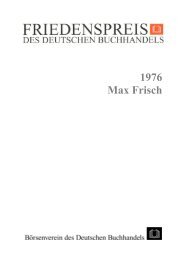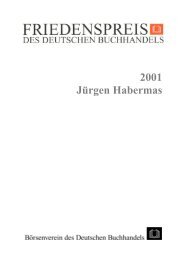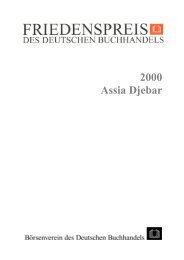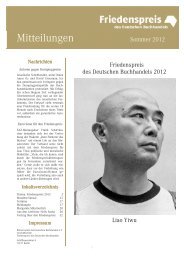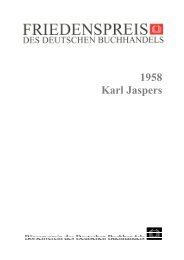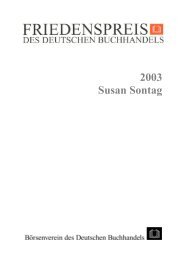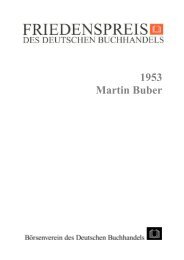2011 Peace Prize speeches - Friedenspreis des Deutschen ...
2011 Peace Prize speeches - Friedenspreis des Deutschen ...
2011 Peace Prize speeches - Friedenspreis des Deutschen ...
Create successful ePaper yourself
Turn your PDF publications into a flip-book with our unique Google optimized e-Paper software.
they can one day say to their children: “Look,<br />
this is how I made it, on my own. And now you<br />
can benefit from this and keep it going.” Where,<br />
if not here – a country in which oil and natural<br />
gas flow like milk and honey in the Promised<br />
Land – could a diversified economy with sound<br />
infrastructures be set up, one in which every<br />
individual could find a niche for his or her talent?<br />
But vultures gather wherever there is oil.<br />
The 60 billion US dollars in energy exports that<br />
flow back to Algeria each year make their way<br />
into many open hands. And even the most experienced<br />
experts can only speculate on exactly<br />
which hands get what. Money engenders discretion.<br />
And the state is more than willing to enforce<br />
this discretion in the form of censorship<br />
and control of the public sphere. Unlike those<br />
dictatorships featuring the more or less picturesque<br />
autocrats who characterized the Arab<br />
world until recently, from the outside, Algeria<br />
appears to be a very clearly structured presidential<br />
republic. The president is elected by the<br />
people every five years, and the elections are in<br />
no way a mere farce. However, any attempt to<br />
gain a clear picture of actual power relations is<br />
like walking through a dense fog. We can only<br />
fully comprehend this predicament when we<br />
listen to experts. The more they know and tell,<br />
the more enigmatic the predicament becomes.<br />
There are undisputed centers of power, such as<br />
the official government, the army, the police, the<br />
intelligence agency, industrial organizations,<br />
Islamic movements and a colorful mafia. And<br />
yet, nobody seems to know exactly how these<br />
centers of power behave in relation to each<br />
other; or the extent to which they are enemies or<br />
allied or both simultaneously; or exactly when<br />
one scratches the other’s back or when they<br />
come to blows. Algeria’s political identity is a<br />
puzzle even for people active in the government’s<br />
innermost circles. A couple of years ago,<br />
Major General Mohamed Touati, the security<br />
advisor to President Bouteflika, wrote the following<br />
with astonishing frankness: “The regime is<br />
neither dictatorial, nor democratic, nor presidential,<br />
nor parliamentary … We certainly don’t live<br />
in a monarchy; but, all in all, do we really live in<br />
a republic?” This entire sentence is one big question<br />
mark.<br />
The competing power groups keep each<br />
other in a mutual and precarious equilibrium,<br />
and there seems to be enough money for them<br />
all. There is no precise political term for such a<br />
<strong>Peace</strong> <strong>Prize</strong> of the German Book Trade <strong>2011</strong><br />
6<br />
system. But when we think of the recent revolutions<br />
in the Arab world, and when we think of<br />
what may still become of them, it’s possible that<br />
the missing term has yet to emerge. The fact is<br />
that Algeria already went through a Tunisian-<br />
and Egyptian-type of revolution in 1988. It was<br />
followed by three hopeful years, and then a barbaric<br />
civil war broke out. It lasted seven years<br />
and cost 200,000 lives, most of them civilian.<br />
When the carnage was over, the system we<br />
know today was constructed. Similar things<br />
could happen elsewhere as well.<br />
In addition to this microscopic view, Boualem<br />
Sansal’s work also features the historical<br />
perspective. Since he loves his homeland, its<br />
history is ever-present to him. As part of his<br />
character, it permeates his writing completely. It<br />
is stirring in each and every sentence. His characters<br />
become representatives of historical processes<br />
yet remain distinct individuals. One example<br />
can be found in his latest, as yet untranslated<br />
novel “Rue Darwin,” in the form of the powerful<br />
grandmother figure, an entrepreneur on a<br />
grand scale, director of the country’s most successful<br />
brothel, head of a clan that has succeeded<br />
in networking itself worldwide in today’s globalized<br />
economy <strong>des</strong>pite coming from the depths of<br />
the past. Though she is figure straight out of a<br />
Fellini film, she lives and rules not in a fantastical<br />
world but, rather, in this sharply-seen Algeria<br />
with its terrible history.<br />
And it is a terrible history. Indeed, there are<br />
very few countries in Europe’s radius whose<br />
history in the second half of the 20th century<br />
was as bloody. Already on May 8, 1945, the day<br />
Europe drew a deep breath of relief, there was a<br />
massacre in Algeria that claimed thousands of<br />
lives. From then on, the killing never really<br />
stopped – and it continues even today. The names<br />
given to each battle depend on who has the<br />
privilege of interpreting them at the time: It can<br />
be a war of liberation, a rebellion, a coup d’état, a<br />
religious war, an act of terror. In July of this year<br />
alone, in Sansal’s current hometown of Boumerdès,<br />
eight attacks were carried out resulting in<br />
death and injury. The author himself has put up<br />
a barbed-wire fence around his house, he doesn’t<br />
go out at night, and he never drives in rural<br />
areas. So, what does he do? He writes. He tells<br />
stories. He speaks of his life – even though doing<br />
so means putting it at risk.




